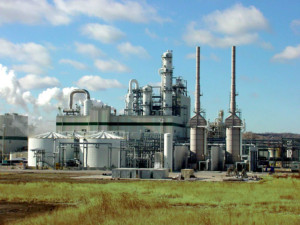
NatureWorks Ingeo plant (c) NatureWorks
A new initiative at NatureWorks will ensure that, by 2020, 100 percent of the agricultural feedstock for Ingeo™ PLA and Vercet™ performance chemicals (lactides) will be certified by the International Sustainability & Carbon Certification System (ISCC) according to the ISCC PLUS system of best practices in agricultural production.
NatureWorks was the first biopolymers manufacturer to become certified to the new ISCC PLUS standard in 2012, and currently has more than 40 percent of its agricultural feedstock certified. At full capacity, more than 90 farms will be involved in the programme by 2020.
The ISCC PLUS certified crops are grown within 50 miles of the NatureWorks’ Blair, Nebraska, production facility, which has an annual production capacity of 150,000 metric tons of Ingeo biopolymer. Every farm entering the programme receives training in adhering to the ISCC PLUS certification’s principles, which are the following:
- Protect highly biodiverse and high carbon stock areas.
- Implement best agricultural practices for the use of fertilizers and pesticides, irrigation, tillage, soil management, and the protection of the surrounding environment.
- Promote safe working conditions.
- Comply with human, labor, and land rights.
- Comply with laws and international treaties.
- Implement good management practices and continuous improvement.
“New materials innovation is being driven by the tenants of the circular bioeconomy, and as we seek to decouple plastics from fossil feedstocks, we remain committed to feedstock diversification and to critically assessing the sustainability of each and every feedstock we use,” said Rich Altice, CEO and President of NatureWorks.
ISCC PLUS is an independent third-party sustainability certification system developed in a multi-stakeholder initiative. The comprehensive programme certifies the sustainability of agricultural feedstocks used for biobased products, including both the environmental and social aspects of agricultural production. Site specific audits and certificates ensure full traceability and chain of custody along the supply chain, ensuring that the total volume of Ingeo received by the final user of the product can be traced back and documented through a mass balance system to the equivalent amount of certified, sustainable crop produced. ISCC certification has been adopted by global brands and is supported by non-governmental organisations.
“We are very happy about NatureWorks’ commitment to sourcing sustainable agricultural feedstock,” said Gernot Klepper, Chairman of the ISCC Association. “Agricultural producers have both a responsibility and a tremendous chance to contribute to meeting the Sustainable Development Goals of the United Nations. Certification with ISCC PLUS enables farmers to move toward more sustainable agricultural practices, thus supporting ecologic and social, as well as economic sustainability in agriculture and rural areas.”
As part of NatureWorks’ commitment to renewable, sustainable feedstocks and materials, the Ellen MacArthur Foundation recently announced that NatureWorks, along with other global brandowners and manufacturers, have signed the New Plastics Economy Global Commitment. As a signatory, NatureWorks committed to the following in support of sustainable agriculture for bioplastics:
- By 2019, 60 percent of the company’s feedstock will be certified as sustainably and responsibly managed via ISCC PLUS.
- By 2020, 100 percent of feedstock will be certified as sustainably and responsibly managed via ISCC PLUS.
By 2025, 100 percent of new feedstocks for additional manufacturing capacity will be certified as sustainably and responsibly managed via an independent third-party administered programme.